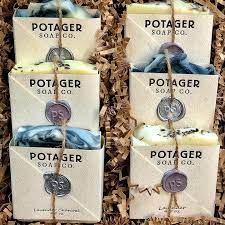Why Potager Love's to Make Cold Process Soap
May 18, 2024

Soap making through the cold process method is a time-honored craft that has been passed down through generations. While there are various techniques for making soap, the cold process stands out for its simplicity, versatility, and numerous benefits. Let's explore the cold process of soap making in detail and learn why it's the preferred method at Potager Soap Co.
What is the Cold Process?
Traditionally, the cold process of soap making involves mixing oils, lye (sodium hydroxide), and water at room temperature, allowing them to naturally undergo a chemical reaction known as saponification. This reaction transforms the ingredients into soap and glycerin over time. Unlike the hot process, which involves heating the ingredients to accelerate saponification, the cold process relies on the slow, natural curing of the soap.
Benefits of the Cold Process:
-
Preservation of Beneficial Ingredients:
One of the primary advantages of the cold process is the preservation of beneficial oils and additives. Because heat isn't applied during the soap-making process, delicate oils and fragrances remain intact, ensuring that the final product retains its nourishing properties. Natural ingredients like shea butter, coconut oil, and essential oils can be incorporated at their optimal potency, offering moisturizing, soothing, and aromatic benefits to the skin. -
Customization:
The cold process allows for greater control over the soap's composition, making it highly customizable. Crafters can tailor recipes to suit specific skin types, preferences, and therapeutic needs. Whether it's creating a luxurious moisturizing bar for dry skin or a gentle exfoliating soap for sensitive skin, the cold process offers endless possibilities for formulation. -
Superior Texture and Lather:
Cold process soap tends to have a smoother, creamier texture compared to soaps made using the hot process method. The slow curing time allows for the formation of smaller soap crystals, resulting in a lather that feels luxurious and gentle on the skin. This creamy lather not only cleanses effectively but also leaves the skin feeling soft and refreshed. -
Environmental Sustainability:
From an environmental perspective, the cold process is advantageous. Because it doesn't require energy-intensive heating, it's considered a more sustainable method of soap making. Crafters can utilize natural, biodegradable ingredients and minimize their carbon footprint while producing high-quality, artisanal soaps.

